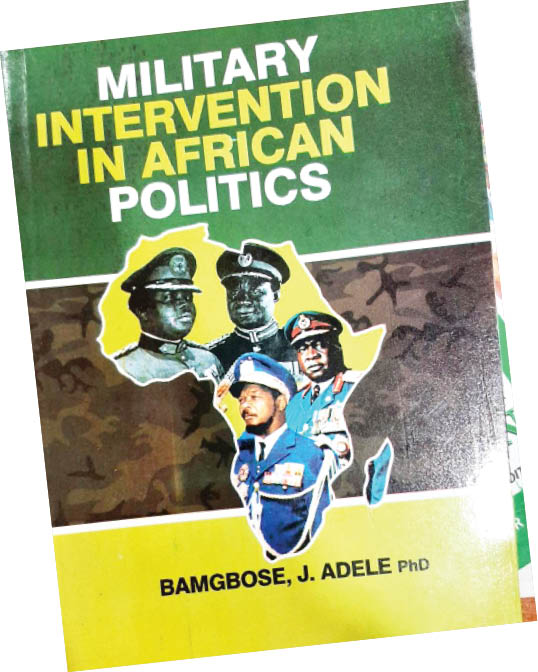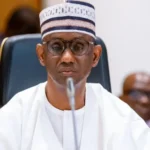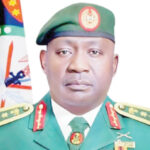Book Title: Military Intervention in African Politics
Author: J. Adele Bamgbose
Publisher: Favour Printing Press
Date of Publication: 2020
Pages: 266
Reviewer: Professor Sylvester Odion Akhaine
On February 1, 2021, a Coup d’état took place in Myanmar. The military overthrew a democratically elected government of Aung San Suu Kyi. The justification for the take-over of government was that Kyi’s National League for Democracy (NLD) party won the general election of November 8, 2020 by a landslide but rejected by the military-backed opposition party, Union Solidarity and Development Association (USDA), which alleged fraud. The military immediately declared a state of emergency for one year and promised to return the country to civil rule thereafter. It has been unable to secure the support of most of the citizens of that country who are currently locked in street battles with the junta amidst international condemnation, sanctions, and prodding that the men on the horseback should retreat into the barracks.
- NPFL clubs re-strategizing for second round
- I am a female comedian that performs based on current issues – Zee Pretty
August 18, 2020, there was a coup d’état in Mali against the government of Ibrahim Boubacar Keita who was allegedly involved in the manipulation of the March 2020 legislative elections to the disenchantment of a large segment of the population. The coup was not supported by the Africa Union (AU) and the Economic Community of West African States (ECOWAS). These transnational organisations in the continent of Africa have anti-coup protocols which have evolved in the context of the global third wave of democratisation. As it turned out, Nigeria’s former President Goodluck Jonathan became the ECOWAS special envoy to broker a return to civil dispensation with the putschists. These two events underline two major political currents. One is the resilience of military interventionism in politics. And the other is the operationalisation of intolerance of military intervention in the political process and the desire to consolidate democratic rule on a global basis. To state differently, there is the enduring desire to replace the barrel of the gun with the ballot paper. Equally, the events also dramatise the interplay of the social forces in society that usually engender military incursion into politics captured in the extant literature. Jimoh Adele Bamgbose’s Military Intervention in African Politics articulates these issues in ways that underline their pervasiveness.
Military Intervention in African Politics, a nineteen-chapter book is holistic in its approach to the subject. To background the depiction of the military and its foray into politics, the book looks at the traditional African societies and their military organisation. Historically, African societies were patterned on the band, segmentary, acephalous, and centralised formations. It reveals that the military forces in the pre-colonial African societies had different organisational forms corresponding to the social organisation of each society. There were citizens’ army, professional army, and evolutionary army. The citizens’ army was more or less the type in which able-bodied men were mobilised for war in times of emergency, and thereafter disbanded. The professional army existed in more centralised societies such as Benin Dahomey, Oyo, and Sokoto Caliphate among others. The evolutionary army was identified with nomadic tribes which had to constantly adapt to the objective realities of their situation. The African armies had a place for women and were exemplified by the Amazons of Dahomey. An important doctrinal element of the pre-colonial African armies was the presence of civil-military relations that was fused with the political leadership and the society. The military was subordinated to the society and since all able-bodied men were involved as in the case of citizens’ army, the question of insubordination to civil authority was not an issue as such. In some cases, the King who was the commander-in-chief led battles. This was the case of Oyo before the role became reserved for Aare Ona Kakanfo.
A pertinent question to ask is: what became of the African armies? The interface with aliens marked the annihilation of the African armies. The incursion of the Europeans across the Atlantic marked the destruction of African armies. The balkanisation of Africa among the European powers at the Berlin conference of 1884-85 led to the complete liquidation of the African armies. African history is replete with milestones of the European conquest of African societies. For example, Lagos conquered in 1861, Oyo 1888, Dahomey 1894, Benin 1897, Sokoto 1903, and Ohori-Ije, 1914. The point must be made that in the war of resistance to the European takeover of the continent, Africans were killed in their thousands, and settlements were raised in the wars that were genocidal in dimension.
However, the political takeover of Africa by the Europeans meant the reorganisation of African societies along with the patterns of European social organisation. It entailed the creation of a functioning state and a military formation to guarantee the stability of the state. This is the provenance of the modern military in Africa. But it is important to underline here the recruitment policies of the colonisers. As David Killingray has noted, soldiers were recruited from ex-slaves, freebooters, and brigands. The British even applied the binary theory of martial and non-martial people. Thus, they recruited into the colonial army “illiterates from less accessible parts of the territory” (p. 44). This explains today the reactionary nature of the African armies. In their role as guarantors of the colonial order, they were hated by the population. The colonisers controlled the command hierarchy of the colonial army to the extent that at the time of independence, there were few African commissioned officers in the organisation. The French were more systematic in the Africanisation of the army officers’ corps by establishing formal military institutions in Chad and Cote d’Ivoire. As for the British, they were conservative in Africanising the command structure of the army except for Sudan where the localisation of the Officer corps began in 1918. As noted by William Gutteridge, the Nigerian army at independence had 81 Africans of the 300 officers, and the most senior was a Lieutenant-Colonel (P. 49).
The book overviews military coups in Africa with a focus on countries like Benin, Ethiopia, Gambia, Ghana, Liberia, Mali, Nigeria, Sudan, Togo, and Uganda. The timeline of these events is commonplace, so also are the contexts. Nevertheless, the book revisits the well-known arguments on military intervention averred by scholars such as Maurice Janowitz, Samuel Decalo, Samuel Huntington, and Ruth First. To be sure, the nature of the modern military, the political and institutional configuration of society, low political culture or political development, psychological propaganda, the permanence of conflict, and political ambition are some of the reasons that have been adduced for military intervention in politics (pp. 107-109).
However, the point of departure is the focus on the more critical issues of civil-military relations and military disengagement from African Politics. The viewpoint of Carl Von Clausewitz expressed in his classical work, On War, provides a pathway. He has noted that subordination of the military point of view to the political is… the only thing which is possible” (quoted on p. 81). This is a weighty issue in developing democracies, and quite complex too. As noted by Janusz Onyszkiewiecz concerning the Polish democracy, “Civilian democratic control of the armed forces is too often taken as axiomatic” in ways that belie its complexity. However, democratic control of the military means the subordination of the military to civil authorities or political leadership. There are, however, measures that can help to institutionalise this control such as its engrossment in the grundnorm, civil society oversight, and military professionalism. Besides is Huntington’s dual prescription, namely, subjective and objective civilian control of the military. While the former socialises the military to the norms of society, the latter emphasises an autonomous sphere of action for the military, seen as problematic by Richard Kohn because it can actually undermine control. However, the book presents several strategies for civil control of the military ranging from ascriptive, psychological, and mission manipulations to pay-offs, and co-optation among others.
On military disengagement, its patterns are explained. Disengagement of the military from politics has taken different forms such as personalist transformation, otherwise known as self-transmutation, orderly transition involving free and fair elections, disorderly transition involving counter-coup or civil disorder, and arbitrator demilitarisation, where the military restores order and hands over to a civilian regime. Also, the book deals with military terms such as coup d’état, mutinies, reformatory military regimes, guardian military regimes, radical military regimes, and fractional regimes.
This book re-awakens us to political issues that are consequential but lost in the din of avarice of political actors and devaluation of scholarship by the proliferation of what Paulo Freire has called magical consciousness that seeks causation in the other-worldliness instead of objective realities. The insertion of terms employed as a chapter in the work would have been preferable as a glossary of terms. The book did not engage the whole debate of military vanguardism, which the advent of Jerry Rawlings and Thomas Sankara in Burkina Faso ignited in the late 1980s. Given the transformation in those countries, they became a reference point for discourses on the transformation of societies through the military institution. While the role of the international community in the barracking of the military is mentioned, its latent function in the expansion of the liberal zone of peace that enhances capital realisation is not discussed. In the light of the resilience nature of coup d’état in the developing world, I have argued elsewhere (Threat to Democracy in Africa) the objective conditions present in Africa underlined by extreme poverty, elite infamy, and external meddlesomeness, will make coup a permanent feature of the continent. Concerning Nigeria, the ascriptive nature of the army dominated by a section of the country renders impossible a radical outcome.
Structurally, the book is pedantic in presentation and could have benefited from proper editing. Given the voluminous content of the work, a subject-index section could have been invaluable. But politicians willing to learn and unlearn, students of politics and the general public will find this book extremely useful.

 Join Daily Trust WhatsApp Community For Quick Access To News and Happenings Around You.
Join Daily Trust WhatsApp Community For Quick Access To News and Happenings Around You.


